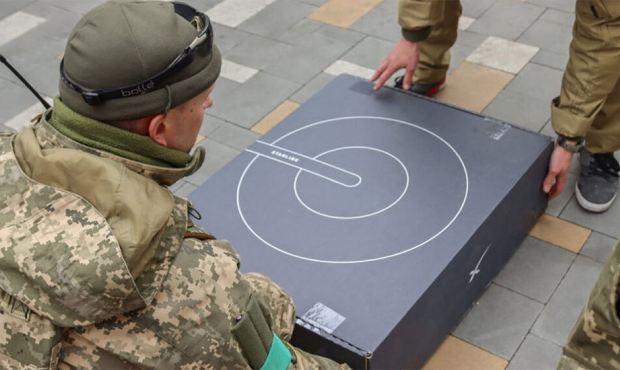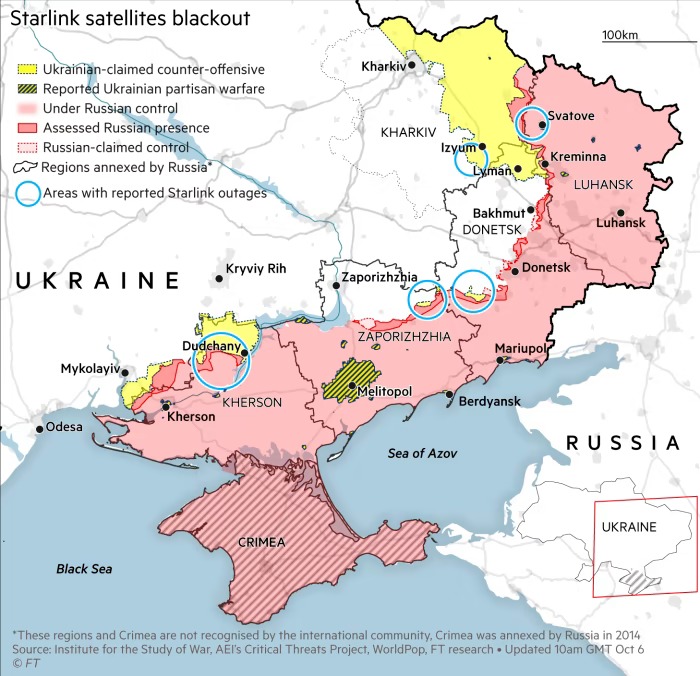Ukrainian forces report Starlink outages during push against Russia
Some of Elon Musk’s SpaceX devices stopped working when Ukrainian soldiers liberated territory, Kyiv officials say

Ukrainian troops have reported outages of their Starlink communication devices on the frontline, hindering efforts to liberate territory from Russian forces, according to Ukrainian officials and soldiers.
Thousands of Starlink terminals, made by Elon Musk-owned SpaceX, were purchased by the US government and crowdfunded by donors to help Ukrainian troops operate drones, receive vital intelligence updates and communicate with each other in areas where there are no other secure networks. The systems which connect a small antenna to a 35-centimetre-high terminal also provide internet for Ukrainian civilians.
Some of the outages led to a “catastrophic” loss of communication in recent weeks, said one senior Ukrainian government official with direct knowledge of the issue. Many were reported as soldiers breached the frontline into Russian-controlled territory and some during pitched battles, the official said, speaking under the condition of anonymity.
They were acute in the south around the Kherson and Zaporizhzhia regions, but also occurred along the front line in eastern Kharkiv, Donetsk and Luhansk, the official said.
All four regions are the focus of an intense Ukrainian counteroffensive and were claimed last month by President Vladimir Putin as part of Russia after referendums staged by Kremlin proxies.
Another Kyiv official said the connection failures were widespread and prompted panicked calls from soldiers to helplines. Both Ukrainian officials said the problems occurred when soldiers liberated territory from Russia and moved past the frontline.
The disruptions underline the outsized role of Musk’s communications systems in the battlefield as Ukraine’s counteroffensives in the east and south of the country push Russians into retreat. The US-based entrepreneur angered Kyiv last weekend, when he outlined a ceasefire plan that would result in ceding Ukrainian territory to Russia.
Roman Sinicyn, a co-ordinator at the Serhiy Prytula Charity, a foundation that donates Starlink systems to the Ukrainian armed forces, said the problem may be occurring because SpaceX was trying to prevent its misuse by Russian forces.
The blackouts were being experienced in areas so recently regained that their liberations had “not been made public yet,” he said.
“It is absolutely clear to me that this is being done by representatives of Starlink to prevent the usage of their technology by Russian occupation forces,” Sinicyn said. The Ukrainian military and SpaceX need to co-ordinate more closely, he said.
Musk and SpaceX did not respond to requests for comment. Oleksiy Reznikov, Ukraine’s defence minister, declined to comment. A spokesperson for General Valeriy Zaluzhnyi, commander-in-chief of Ukraine’s armed forces, declined to comment.
Three soldiers operating on the frontline confirmed their Starlink systems stopped working during battles. Several terminals have not worked in recent days in newly liberated areas near Kharkiv where Ukrainians pushed east towards the Luhansk region, according to one of the soldiers, who is part of a special forces unit fighting in the area.
But two other Ukrainian military sources said earlier this week that their Starlink systems were functioning in newly-liberated territory east of Izyum and in the southern Kherson region.

Two western officials said they were aware of outages, but declined to comment further, including on their location.
Musk gave a boost to Kyiv in the early days of Russia’s full-scale invasion of Ukraine by allowing his Starlink satellites to emit in the country, helping the army circumvent Moscow’s internet cut-off.
But this week he triggered outrage among Ukrainians and their allies by suggesting the borders between Russia and Ukraine be decided by new referendums. He also said he recognised the Crimean peninsula that Moscow unilaterally annexed in 2014, and said he believed Russian-speaking areas of eastern Ukraine “prefer Russia.”
In 2021 Musk spoke via video link at a conference organised by Sergei Kirienko, Putin’s domestic policy chief in charge of Russia’s assimilation of the annexed territories. On Wednesday Musk wrote in a tweet that he had spoken to the Russian president last year.
Kremlin spokesperson Dmitry Peskov on Thursday declined to comment on Musk’s video meeting with Putin and said he was not aware of Starlink being accessible in Russia.
Additional reporting by Max Seddon in Riga and Richard Waters in San Francisco «The Financial Times»
